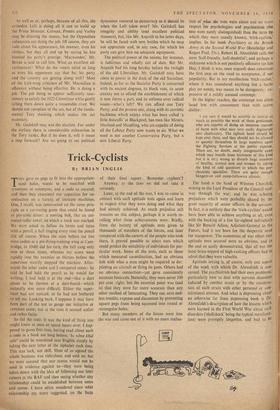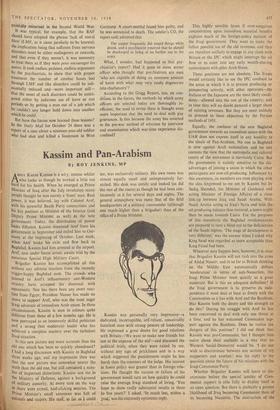Trick-Cyclists
By BRIAN INGLIS Ticv gave us pegs to fit into the appropriate- sized holes, words to be matched with synonyms or antonyms, and a code to unravel; and then they examined our capacities for co- ordination on a variety of intricate machines. One, I recall, was constructed on the same prin- ciple as a car-racing game that could be found at pin-table dives: a moving belt, like an ani- mated roller towel, on which a track was marked. We were asked to follow its twists and turns with a pencil, a bell ringing every time the pencil slid off course. When the man before me (we were cadets at a pre-flying-training wing at Cam- bridge, in 1940) did his turn, the bell rang only two or three times, whereas my score went rapidly into the twenties or thirties before the supervisor wearily stopped the machine. After- wards the other cadet and I compared notes: he said he had held the pencil as he would for writing; I had held it at the end—like a dart about to be thrown at a dart-board—which naturally was more difficult. Either the super- 'visor had not noticed, or he had not bothered to tell me. Looking back, I suppose it may have been part of the test to gauge our initiative or common sense; but at the time it seemed unfair and rather futile.
So did the code. It was the kind of thing you might know at once or spend hours over. I hap- pened to guess first time, having read about such a code in a book not long before; 'Its 'Mins khjd sghe could be translated into English simply by taking the next letter of the alphabet each time. This was luck, not skill. Most of us agreed the whole business was ridiculous, and said so; but we were assured that our scores would not be used in evidence against us—they were being taken down with the idea of following our later careers in the RAF and then seeing whether any relationship could be established between score and career. I have often wondered since what, relatiOnship my score suggested, on the basis of their final report. 'Remuster .cyphers'? Anyway, at the time we did not take it seriously.
Later, at the end of the. war, I was to come in contact with such aptitude tests again and learn to respect what they were doing and what they had already achieved. As much prejudice still remains on this subject, perhaps it is worth re- calling what these achievements were. Briefly, from the battery of aptitude tests given to thousands of members of the forces, and later compared with the careers of the people who took them, it proved possible to select tests which could predict the suitability of individuals for par- ticular work. Some of the tests, such as those which measured co-ordination, had an obvious link with what a man might be required to do: piloting an aircraft or firing its guns. Others had no obvious connection—yet gave consistently accurate forecasts. Naturally, they were never 100 per cent. right; but the essential point was (and is) that they were far more accurate than any other method of forecasting. They can save end- less trouble, expense and discontent by preventing square pegs from being squeezed into round or rectangular holes.
But many members of the forces went into the war and came out of it with no more realisa- tion of what the tests were about and no more respect for psychologists and psychiatrists (the two were rarely distinguished) than the term by which they were usually knoWn, `trick-cyclists,' implies. In his book Psychiatry in the British Army in the Second World War (Routledge and Kegan Paul, 35s.), Robert H. Ahrenfeldt calls the term 'half-friendly, half-doubtful'; and perhaps a nickname which is not positively offensive (as Ian Hay, I think it was, once argued) does constitute the first step on the road to acceptance, if not popularity. But in my recollection 'trick-cyclist,' where it was considered anything but a facile play on words, was meant to be derogatory : ex- pressive of a mildly amused contempt.
In the higher reaches, the contempt was often laced less with amusement than with active, dislike: am sure it would be sensible to restrict as much as possible the work of these gentlemen, who are capable of doing an immense amount of harm with what may very easily degenerate into charlatanry. The tightest hand should be kept over them, and they should not be allowed to quarter themselves in large numbers upon the Fighting Services at the public expense. There are, no doubt, easily recognisable cases which may benefit from treatment of this kind but it is very wrong to disturb large numbers of healthy, normal men and women by asking the kind of odd questions in which the psy- chiatrists specialise. There are, quite enough hangers-on and camp-followers already.
The hand is the hand of Winston Churchill, writing to the Lord President of the Council mid- way through the war; and he was echoing prejudices which were probably shared by the great majority of senior officers in the services. In fact, it is unlikely that the 'trick-cyclists' would have been able to achieve anything. at all, even with the backing of a few far-sighted individuals like Sir Ronald Adam, Adjutant-General to the Forces, had it not been for the desperate need for manpower. The economies of war effort that aptitude tests secured were so obvious, and in the end so easily demonstrated, that all but the most brass-topped of high-ranking officers had to admit that they were valuable.
Aptitude testing is, of course, only one aspect of the work with which Dr. Ahrenfeldt is con- cerned. The psychiatrists had their own problems; particularly how to deal with nervous disorders induced by combat strain or by the combina- tion of such strain with other personal or con- stitutional stresses. And what is depressing about an otherwise far from depressing book is Dr. Ahrenfeldt's description of how the lessons which were learned in the First World War about such disorders ('shellshock' being the typical manifesta- tion) were promptly forgotten, and had to be painfully relearned in the Second World War.
It was typical, for example, that the RAF should have adopted the phrase 'lack of moral fibre' (LMF, as it came jocularly to be known); the implication being that sufferers from nervous disorders must be either malingerers or cowards, and that even if they weren't, it was necessary to treat them as if they were pour encourager les autres. It took endless patience, endless arguments by the psychiatrists, to show that with proper treatment the number of combat hours lost through LMF and like disorders could be sub- stantially reduced and—more important still— that the onset of such disorders could be antici- pated either by judicious use of leave or rest Periods or by getting a man out of a job which he couldn't any longer hold down into another which he could.
But have the forces now learned these lessons? In the Daily Mail for October 24 there was a report of a case about a nineteen-year-old soldier who had shot and killed a lieutenant in West Germany. A court-martial found him guilty, and he was sentenced to death. The soldier's CO, the report said, admitted that The sapper frequently did stupid things while drunk, and a psychiatrist reported that he should be discharged as being of no further use to the army.
What, I wonder, had happened to that psy- chiatrist's report? Had it gone to some senior officer who thought that psychiatrists are men 'who are capable of doing an immense amount of harm with what may very 'easily degenerate into charlatanry'?
According to the Grigg Report, too, on con- ditions in the forces, the methods by which army officers are selected today are thoroughly in- efficient; the need to revise them is thought even more important that the need to deal with pay grievances. Is this because the army has reverted to the pre-war method of selection by interview and examination which war-time experience dis- credited?







































 Previous page
Previous page